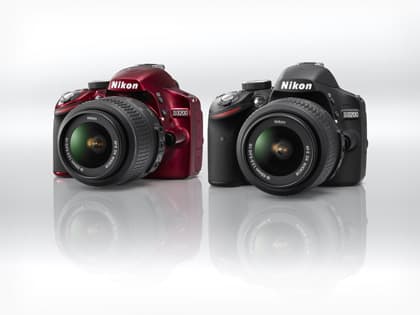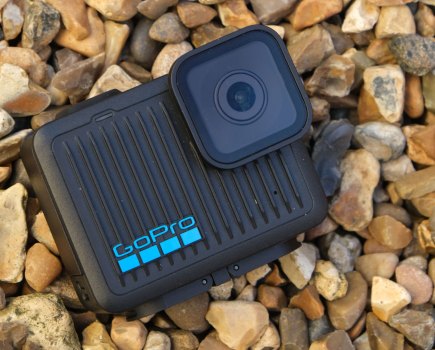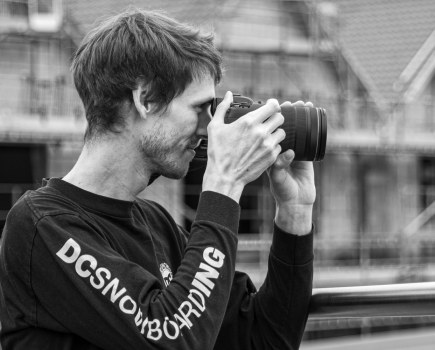It seems the pixel race is far from over as Nikon?s latest entry-level DSLR notches up almost double its predecessor?s count. Mat Gallagher takes a first look at the new Nikon D3200
 With two major DSLR launches already under its belt this year, Nikon is showing no let-up as focus shifts to its entry-level models.
With two major DSLR launches already under its belt this year, Nikon is showing no let-up as focus shifts to its entry-level models.
Attending the launch event in London, I had the chance to sample the camera and talk to the Nikon team about its development. Though many will see this new D3200 as an update of the D3100 Nikon is keen to stress that it is not a replacement. The D3100, released almost 14 months ago, will remain on sale alongside the D3200, as an entry-level proposition. In looks the D3200 may not seem to be a major update but beneath the surface it features a highly specified new sensor and the same processor as the professional D4. This camera has a strong feature set for both still and video use, and may appeal as much to those considering the D5100 and D7000 as it will to the entry-level photographer.
As with the D3100, the D3200 is aimed at what Nikon describes as the ?family? user and its main selling point is the all-encompassing Guide mode. This not only explains the camera?s features and helps users take better shots, but also leads them through the process of setting the right modes, allowing them to learn along the way. The previous version was already comprehensive in this regard but the latest incarnation includes more scenes types as well as visual interpretations of the changes made. New scenes include capturing more reds in a sunset, taking bright photos, taking dark/low key pictures, and reducing blur. Settings such as white balance control, aperture and exposure compensation now have visual examples to show how changing the setting affects the image.
Outside of the Guide mode the D3200 contains all of the manual control you would expect from a Nikon DSLR, including a 4fps burst rate and an ISO range of 100-6400 with an expanded 12,800 ISO Hi 1 setting. The focusing system remains the capable Multi-CAM 1000 with 11-point AF including a cross-type centre point. It also features the EXPEED 3 processor, as used by the D4, D800 and Nikon 1. This processor, we are told, ensures the support of the latest high-speed SD cards and the use of the H.264 video codec.
Video sees a slight upgrade here too, with full 1080P filming available in 25 and 30 frames per second as well as the previous 24fps, while 50/60fps shooting is available when in 720P HD. The D3200 features a built-in mono microphone for audio but also, impressively, a 3.5mm mic input for an external microphone device.

Sensor
The most significant part of this camera, however, has to be the sensor. This is a 24.2-million-pixel DX format CMOS device, making this the highest resolution consumer Nikon DSLR to date and only surpassed in the professional range by the D800 and D3X. Such a high resolution seems a strange choice for an entry-level camera but, as Nikon confirms, this is a sector of the market where the number of pixels matter most. It puts it ahead of high-end compact system cameras from Sony and Samsung and, Nikon believes, gives the option for users to crop their images much more closely without losing substantial quality. As more knowledgeable photographers are all too aware, though, extra pixels don?t always mean better quality. Smaller pixels make the sensor more prone to noise and a greater signal-to-noise ratio. The pixel pitch on the new sensor is 3.85nm compared to 4.94nm on the 14.2MP D3100. Nikon claim that the noise levels can match those of the old camera, which shows that significant development has been made to the sensor but we?re told in some conditions the D3100 out performs the newer model. Sensors in Nikon cameras have in recent times performed very well with regard to noise, so we look forward to testing whether this is still the case with such a high resolution.
The D3200 allows users to crop into their photos as part of the in-camera editing controls after taking the photo, though it is a slight shame this cropping cannot be applied pre-capture, as a form of digital zoom. Sony?s use of a telephoto button has proved successful and the ability of the Nikon FX models to crop in could have been adapted for use here.

Body and screen
The camera body may not look much different to the D3100 but there have been subtle changes to the layout to improve navigation. The D3200 is a small camera but has a substantial grip, so it is easy to hold. On the back there is now a dedicated drive mode button for quick access to the high-speed burst and timer settings, and a live view button rather than a switch. The dedicated movie record button now sits on top by the shutter, rather than the back and the menu buttons down the side of the screen feel less recessed than before. The LCD screen remains 3in (7.5cm) in size but takes a significant jump from 230k to 921k pixels. The viewfinder maintains the same 95% coverage and 0.8x magnification as the D3100.

Effects
The in-camera editing controls have had an upgrade too, with Miniature, Colour Sketch, Selective colour and filter effects as seen on the D5100 added to the mix. These effects can be added both pre or post capture, and the re-touch menu provides a range of controls from raw processing to trimming and cropping.

WiFi module
The essential accessory for this camera is a small WiFi module that plugs into the mini USB port on the side of the D3200. Taking its power from the camera to ensure a smaller form, this module allows you to send your images from your camera to a Smartphone, and then upload and share with the world. As well as sending images, the unit allows the camera to be controlled remotely, including firing the trigger and even previewing the live view screen. The system requires an App to be installed, which is currently only available for Android devices, though an iOS version for iPhones is expected in the autumn. The remote functionality offers the greater creative possibility but being able to transfer images will avoid having to switch to using a cameraphone for those snapshots to share online and is something we should expect to see more of in future cameras.

With such an impressive specification and very small body the D3200 is a tempting proposition. It is a shame that Nikon?s focus seems to have shifted back to megapixels, but only when we fully test the camera will we see whether this has meant an increase in real quality. In all other respects the D3200 looks like a great camera that will certainly give the competition something to consider. It is due to go on sale in mid May, in black and red versions. Prices are expected to be £559.99 body only and £649.99 with 18-55mm kit lens. The WU-1a WiFi device will be £54.99.








